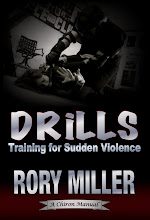I'm editing on the Conflict Communications manual. As always, I hate editing. By the time you get to this stage of editing, you've read the damn thing so many times that you everything sounds redundant and you hate every word.
It feels a little different this time. I love teaching the ConCom class because I can actually see the lightbulbs go off, feel the energy in the room change as people become conscious of a new power. That sounds overblown, but it isn't. Just like the physical stuff we do, ConCom is completely natural, and because it is natural it is intuitive. The class just makes it conscious.
Reading it over, it doesn't have that impact to me. It is a way of thinking that I've become accustomed to over the years, so it reads like a reminder, not a revelation. Not sure if naive readers will get that or not. Probably not, but it is so hard to be sure in the editing process. I fear that a lot of good stories and books are killed in editing. The temptation to make it exciting to me (on the umpteenth reading) would make it incomprehensible to anyone else.
Still to do:
One more time through and expand a few bits
Read for continuity
Create the Table of Contents
Create the internal links for the e-version
Expand the bibliography, bios and add a contact page
Send out to first readers for critiques
Send out for blurbs
Get Intros (I have two great people in mind)
Copyedit pass
Get K to do interior design and cover
Upload
That's the work part of writing, It's a chore but like any job you just do it. And most of it won't take that long. Longest will probably be waiting on the first readers and intros.
Johannes is trying to open up some new markets to teach ConCom in Germany. A university asked about the "table of contents" of the program. The book is way more detailed, but this is the overview:
Maslow's Hierarchy of Needs as a model for sources of conflict
Group needs of humans as social primates
Goals and purposes of social conflict
Goals and purposes of asocial conflict
Triune Brain Theory as a model for reactions to conflict
The Lizard Brain (hindbrain) and survival threats
the Monkey Brain (limbic system) and social threats
The Human Brain (neocortex) and problem solving
Conflict scripts
How to recognize when the limbic system has taken over
How to turn off your limbic system so that you can use the power of your neocortex
How to use the neocortex to evaluate and soothe the other person's limbic system
Followed by a collection of specific tactics.
The book will go into overt violence as well. One of the programs covers dealing with emotionally disturbed people (EDPs) but I think I covered that as well as I could in "Talking Them Through."
So, that's where my time is going.
CCA:
I'll be teaching a session at this year's "Water and Steel" Kelly Worden's annual camp. Professor Trigg will be there as well, and he's one of the Old Dragons I haven't met. Bonus.
Information is here:
http://www.kellyworden.com/water-and-steel-2013
Three-Eighty or Thiry-Eight?
-
L., S&W Model 60 Chief; R., SIG P238
.38 Special versus .380 ACP.
Out of a full-sized sidearm, the .38 Special is the more effective round.
The bullet...
2 months ago



3 comments:
Will it be available for those who haven't attended ConCom?
Thanks,
Vance
Yep, Vance. Amazon and Smashwords at least.
Awesome
Post a Comment